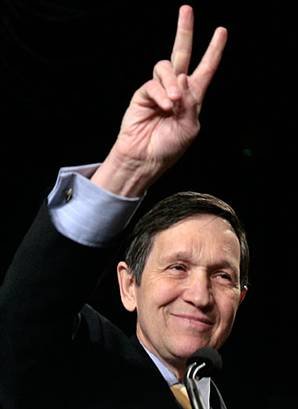How Kucinich’s Resolution to End the War Will Help Us End the War

Tomorrow, Thursday, March 4, Congressman Dennis Kucinich plans to introduce a privileged resolution to end the Afghan War. The resolution requires that the House debate, within the next week, the continuing war in Afghanistan, now the second longest war in American history.
While we may not win a majority vote in the House on this first go-round, and would still have to get past the Senate and the President (a good time if ever there was one to throw Scylla and Charybdis into a blog), we will completely change the conversation and put many congress members on record claiming to oppose the war. While the president can send congressional Democrats out to fall on their swords for unpopular wars and healthcare mandates, they may be less willing to do so if the end of their careers is held up to their noses. To keep their careers alive, congress members in progressive districts will have to claim to oppose the war in/on Afghanistan.
Once they’ve done that, however, it will be much harder for them to turn around next month and vote for another $33 billion to escalate the same war they just pretended to oppose. It’s already harder for them than it was last June when we came within 8 votes in the House of stopping the war money. They can’t lie that they’re voting for a war supplemental “because it’s the last one” because nobody can be found who will believe that again (yes, I checked, and even Sarah Palin calls BS on it). They can’t lie that they just want to support their new president, because he’s not new anymore, he’s not up for reelection like they are, and voters are demanding that their representatives choose jobs and healthcare and green energy instead of war.
Last June, all the Republicans in the House voted No because of unrelated measures included in the bill. That may happen again this time. But whether it does or not, and whether we block the money this time or not, we are building a movement that will eventually do so, and next week’s debate on the floor of the House will be a huge step forward. If you can get to Washington, D.C., I recommend being there. If you can’t, get C-Span and record what your misrepresentative pontificates. You’re going to need that tape next month. Specifically, you’re going to want to bring it to your local Brown Bag Vigil on March 17th.
On Tuesday night, March 2nd, Rep. Kucinich recorded a special message for Progressive Democrats of America. Click here to listen to it and to an hour-long phone call with activists from around the country organizing efforts to defund the war. You can find and contribute to a whip list of congress members’ positions on Kucinich’s resolution and on voting for the next $33 billion at http://defundwar.org.
Please also, right now, contact your member of Congress and ask them to be an original co-sponsor of the Kucinich resolution. Then use the link to ask your friends to do the same.
Here’s the text of the resolution, which will not have a number on it until Thursday:
(Original Signature of Member)
111TH CONGRESS
1ST SESSION
H. CON. RES. ___
Directing the President, pursuant to section 5(c) of the War Powers
Resolution, to remove the United States Armed Forces from Afghanistan.
IN THE HOUSE OF REPRESENTATIVES
Mr. KUCINICH submitted the following concurrent resolution; which was
referred to the Committee on _________
CONCURRENT RESOLUTION
Directing the President, pursuant to section 5(c) of the War Powers
Resolution, to remove the United States Armed Forces from Afghanistan.
Resolved by the House of Representatives (the Senate concurring),
SECTION 1. REMOVAL OF UNITED STATES ARMED FORCES FROM AFGHANISTAN.
Pursuant to section 5(c) of the War Powers Resolution (50 U.S.C.
1544(c)), Congress directs the President to remove the United States
Armed Forces from Afghanistan—
(1) by no later than the end of the period of 30 days beginning on
the day on which this concurrent resolution is adopted; or
(2) if the President determines that it is not safe to remove the
United States Armed Forces before the end of that period, by no later
than December 31, 2010, or such earlier date as the President
determines that the Armed Forces can safely be removed.

